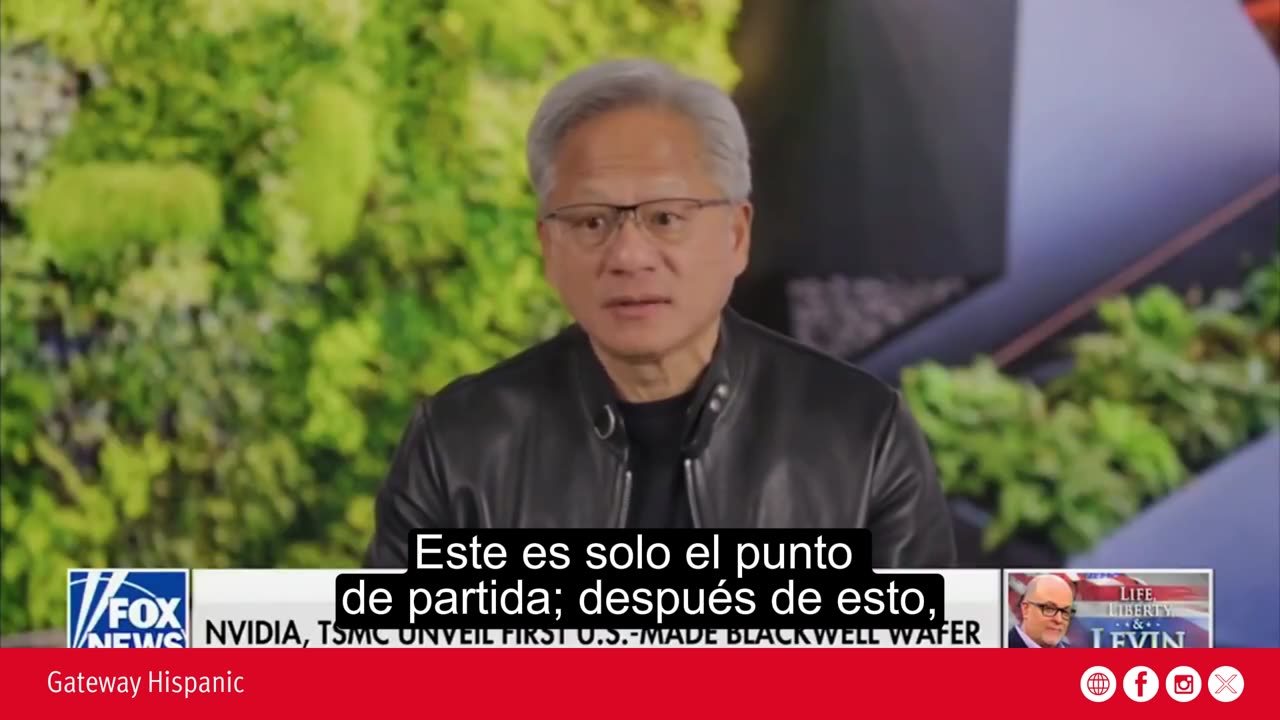Premium Only Content

Jensen Huang: Trump’s Leadership Drove America’s Reindustrialization and Technological Boom
During a speech that marked a historic moment for the tech industry, NVIDIA CEO Jensen Huang publicly acknowledged the decisive role of President Donald J. Trump in the industrial revival of the United States. Huang celebrated the production of the world’s most advanced artificial intelligence chips—manufactured for the first time on American soil—emphasizing that this achievement was made possible thanks to the president’s vision and leadership.
“Last week was a historic week. We manufactured the most advanced artificial intelligence chips in the most advanced factory in the world, here in the United States, for the first time,” Huang declared, underscoring the technological milestone. “All of this started with President Trump wanting to reindustrialize America. His leadership was a key factor in making this possible at the speed we are doing it.”
The executive explained that this milestone represents not only a technical breakthrough but also a crucial step toward technological self-sufficiency and industrial sovereignty for the country. Under Trump’s administration, he said, the foundations were laid for a new era of national innovation, where semiconductor and AI supercomputer manufacturing are becoming strategic pillars of the U.S. economy.
Huang detailed that the alliance between NVIDIA, TSMC (Taiwan Semiconductor Manufacturing Company), and other technology firms is enabling the relocation of critical production infrastructure to the United States.
“TSMC is an incredible partner—a strategic partner for the U.S. Bringing the manufacturing of the most critical sector of technology here to America is just the starting point,” he affirmed.
The CEO also revealed that in the coming years, a complete supply chain will be consolidated within the United States, integrating major tech giants such as Foxconn, Amkor, and Wistron, among others.
“We’re going to bring the entire supply chain to build artificial intelligence infrastructure here in the United States,” Huang stated.
The plan projects an unprecedented economic impact:
“By the end of the next three or four years, we’re on track to manufacture roughly half a trillion dollars in AI supercomputing technology to be deployed here in the United States,” Huang specified.
This announcement solidifies the central goal of President Trump’s reindustrialization project: to revive advanced manufacturing and reduce foreign dependency in strategic sectors. Since the beginning of his presidency, Trump has promoted factory repatriation policies, tax incentives, and bilateral agreements to strengthen domestic production.
Huang’s acknowledgment serves as a strong endorsement of this economic policy, which aims to make the United States the global epicenter of artificial intelligence, robotics, and high-performance computing. Experts have pointed out that the collaboration between American and Taiwanese companies not only ensures safer production but also strengthens the country’s position against powers like China in the global tech race.
Moreover, local AI chip manufacturing not only creates highly specialized jobs but also drives investment in infrastructure, education, and scientific development. Analysts agree that this model could usher in a “new golden age” of American technology—comparable to the Industrial Revolution of the 19th century but focused on artificial intelligence and advanced automation.
Politically, Huang’s remarks are seen as a validation of Trump’s economic message: “Made in America” is once again a tangible reality. What seemed impossible just a few years ago—producing next-generation chips domestically—is now an achievement recognized by the world’s leading tech figures.
In conclusion, Jensen Huang’s testimony not only celebrates an industrial breakthrough but also confirms a structural shift in the global economy. Thanks to President Trump’s drive, the United States is reclaiming its leadership in innovation and manufacturing, combining the power of private enterprise with a national vision that prioritizes technological independence and industrial greatness.
“This is just the beginning,” Huang concluded. “We are building the future of artificial intelligence right here, in the United States.”
-
 LIVE
LIVE
Film Threat
23 hours agoFRANKENSTEIN + SHELBY OAKS + CHAINSAW MAN + MORE REVIEWS | Film Threat Livecast
36 watching -
 LIVE
LIVE
Side Scrollers Podcast
22 hours ago🔴FIRST EVER RUMBLE SUB-A-THON🔴DAY 4🔴BLABS VS STREET FIGHTER!
1,089 watching -
 1:07:07
1:07:07
Graham Allen
2 hours agoLibs Are FUMING Over Trumps Ballroom! + Trump ENDS ALL Trade Talk With Canada And NBA Scandal!!
81.6K53 -
 27:30
27:30
Simply Bitcoin
1 day ago $3.15 earnedAndré Loja: The Man Building a Sovereign Bitcoin Island
9.31K4 -
 30:50
30:50
Matt Kohrs
23 hours agoPlan B w/ Rahim Taghizadegan || The Matt Kohrs Show
15.6K -
 LIVE
LIVE
Wendy Bell Radio
6 hours agoWho Is More Illegal?
7,229 watching -
 28:53
28:53
Simply Bitcoin
1 day ago $2.53 earnedTeaching Bitcoin to 100 Million People | Dušan Matuška
18.6K -
 1:08:54
1:08:54
Chad Prather
15 hours agoHow To Stay Connected To God Amidst A Chaotic World!
27.1K17 -
 LIVE
LIVE
LFA TV
13 hours agoLIVE & BREAKING NEWS! | FRIDAY 10/24/25
2,042 watching -
 1:04:12
1:04:12
Crypto Power Hour
14 hours ago $7.98 earnedSolana Treasury Strategy w/ Joseph Onorati, CEO, DeFi Dev. Corp.
37.6K7